-
Weeks 3-14 are crucial for socializing your Rottweiler.
-
Positive experiences shape their brain and behavior for life.
-
Socialization is more than play; expose them to various environments, people, and sounds.
-
Always use positive reinforcement.
-
Socialization is a lifelong journey; keep providing opportunities for interaction.
In this guide, we’re gonna break down everything you need to know about Rottweiler socialization. We’ll explore why it’s so crucial for their happiness (and yours!), when to start (hint: early!), and how to do it right. Get ready to raise a Rottie who’s the life of the party (and not the one hiding under the table because the doorbell rang!).
Why Socialization Matters: More Than Just Puppy Playdates
We’ve established that socialization is a big deal for Rottweilers. But why? What’s the science behind those puppy playdates and meet-and-greets?
Puppy Brain Development: Those Early Weeks Are HUGE
Think of your Rottweiler puppy’s brain as a super-absorbent sponge during those first few months. They’re soaking up every experience, every sight, every sound, every interaction. And those experiences are literally shaping their brain, creating neural pathways that will influence their behavior for the rest of their lives.
- The Critical Socialization Period: Experts agree that the period between 3 and 14 weeks of age is crucial for Rottweiler socialization (and for puppies in general, really). During this time, their brains are primed to learn about the world and form positive associations with new experiences. This concept is consistently highlighted in resources like the American Kennel Club’s puppy socialization guide and articles from experts like Dr. Ian Dunbar and veterinarian Dr. Joanna Woodnutt.
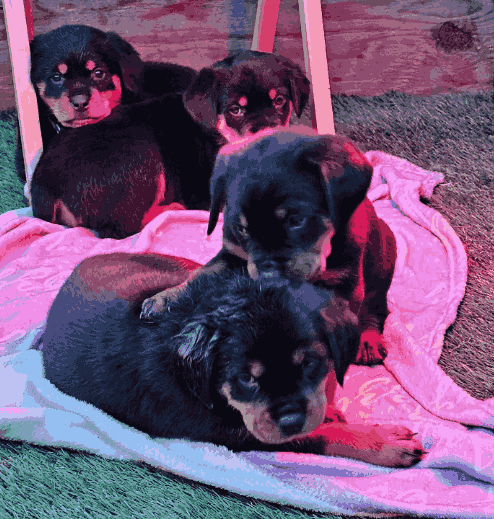
- Shaping those Neural Pathways: Every positive interaction, every new environment, every friendly encounter helps create those “good vibes” pathways in their brains. This makes them more likely to be confident, friendly, and adaptable as they grow up. As Dr. Ellen Lindell, a veterinary behaviorist, explains, “This exposure is like a vaccination for physical disease—by providing safe, controlled social exposures to unfamiliar people and situations, we inoculate them from developing fearful behavior.”
Fear Periods: Navigating those “Whoa, What’s That?” Moments
Now, here’s the thing about puppyhood: it’s not all sunshine and rainbows. Puppies go through phases called “fear periods,” where they might suddenly become more sensitive or cautious about new things. It’s like their brains are saying, “Whoa, hold on a minute, I need to process this!”
It’s normal for puppies to go through ‘fear periods,’ where they suddenly become more cautious. The AVSAB emphasizes the importance of patience and positive reinforcement during these times
- Don’t Freak Out: These fear periods are totally normal! The key is to handle them with patience and understanding. Don’t force your Rottie puppy into situations that scare them, but also don’t avoid those situations entirely. Instead, offer gentle encouragement, positive reinforcement, and a safe space for them to retreat if needed. This approach is supported by numerous experts, including Deb Jones, a dog trainer and retired psychology professor, who emphasizes the importance of a “puppy-driven” approach to socialization.
Why It Matters: A Well-Socialized Rottie is a Happy Rottie
Okay, so we know those early weeks are crucial for brain development, but what does that actually mean for your Rottweiler? Well, a well-socialized Rottie is:
- Fearless (or at least less fearful): They’re less likely to be scared of new people, places, or situations. Think confidently strolling through a crowd instead of cowering behind your legs.
- Friendly and Outgoing: They’re more likely to greet new people and dogs with a wagging tail and a playful attitude, instead of a growl or a bark.
- Adaptable: They can roll with the punches! New environments, unexpected noises, changes in routine – a well-socialized Rottie can handle it all like a champ.
- Chilled Out: They’re less likely to be stressed or anxious in unfamiliar situations, leading to a happier and healthier life overall.
- A Communication Pro: They’ll be better at reading social cues from both humans and other dogs, leading to smoother interactions and fewer misunderstandings.
- Living Their Best Life: Ultimately, a well-socialized Rottweiler is more likely to enjoy a high quality of life, full of confidence, joy, and those awesome Rottie adventures.
The Critical Socialization Period: Puppyhood is Prime Time
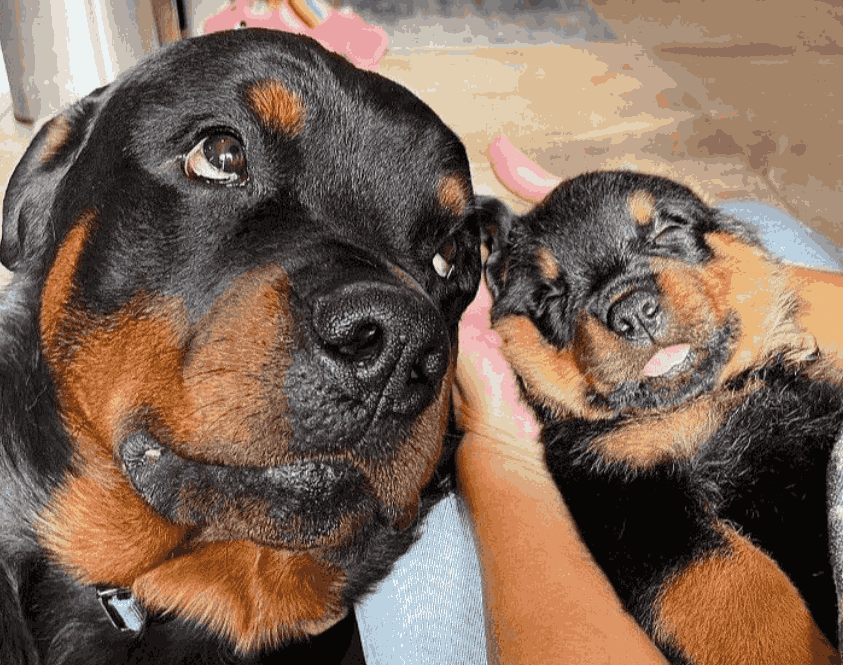
Now that we know why socialization is so important, let’s talk about when to do it. And the answer is… ASAP! Those early weeks with your Rottweiler puppy are like hitting the fast-forward button on their development.
Developmental Stages: A Crash Course in Puppyhood
Puppies go through several key developmental stages, and socialization plays a crucial role in each one:
- Neonatal (0-2 weeks): It’s all about those snuggles and getting used to human touch. Even gentle handling during this time can make a big difference later on (reference the fourth article).
- Transitional (2-4 weeks): Their senses are developing, and they’re starting to explore the world around them. Continued gentle handling and exposure to different stimuli are key (reference the fourth article).
- Socialization (3-12 weeks): This is the prime time for socialization! Their brains are like sponges, soaking up all those new experiences and forming lasting impressions (reference all articles).
- Juvenile (3-6 months): They’re testing boundaries and figuring out their place in the world. Continued socialization and training are crucial for preventing behavioral issues (reference the fourth article).
- Adolescent (6-18 months): Think teenage angst, but with more fur and slobber. They’re becoming more independent, but ongoing socialization helps them navigate those hormonal changes and remain confident and adaptable (reference the fourth article).
The Window of Opportunity: 3-14 Weeks
While socialization is important throughout a Rottweiler’s life, that 3-14 week window is like the VIP access pass to a well-adjusted pup. During this time, their brains are incredibly receptive to new experiences, and those experiences can shape their personality and behavior for years to come.
Early Neurological Development: Building those Brain Highways
Think of your puppy’s brain as a construction zone during those early weeks. New neural pathways are being built at lightning speed, and socialization is like providing the blueprint for those pathways. Every positive experience helps create strong, healthy connections in their brain, leading to a more confident and adaptable dog.
Fear Periods: Navigating those “Whoa, What’s That?” Moments
We’ve already talked about those fear periods, but it’s worth repeating! These phases are a normal part of puppy development, and how you handle them can make a big difference in your Rottie’s long-term confidence. Be patient, supportive, and avoid overwhelming your puppy during these sensitive times.
The Breeder’s Role: Starting Strong
A responsible breeder will start the socialization process early, handling the puppies gently from birth and exposing them to a variety of sights, sounds, and experiences. This gives your Rottie a head start on their socialization journey.
My Socialization Success Story:
I’ll never forget my first Rottweiler, Max. We started socializing him from the moment we brought him home, taking him to puppy classes, introducing him to new people and dogs, and exposing him to all sorts of environments. He grew up to be the most confident, friendly dog I’ve ever known, and I truly believe that early socialization played a huge role in his amazing temperament.
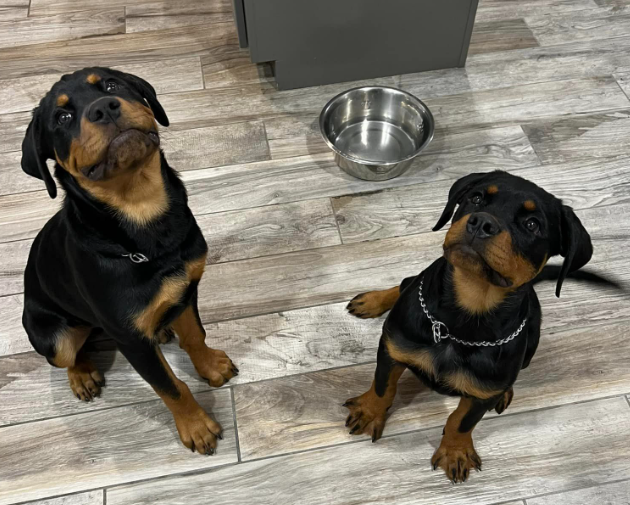
The Bottom Line:
Don’t miss out on that critical socialization window! Those early weeks are crucial for shaping your Rottweiler’s personality and setting them up for a lifetime of confidence and happiness.
Socialization Strategies: Creating Positive Experiences
Alright, we’re ready to dive into the how of Rottweiler socialization. Get those leashes ready, those treat pouches filled, and those positive vibes flowing!
Start Early, Start at Home:
The moment your Rottweiler puppy waddles through your door, the socialization adventure begins! Don’t wait for those puppy classes or dog park trips – your own home is a socialization wonderland waiting to be explored.
- Home Sweet Home: Think about it: your house is full of new and exciting things for a puppy! Different floor surfaces (carpet, tile, hardwood), weird noises (that vacuum cleaner!), and strange objects (that wobbly floor lamp!) are all opportunities for your Rottie to learn and adapt. Let them explore (under your supervision, of course) and create positive associations with their home environment.
- Touchy-Feely Fun: Get your puppy used to being touched and handled all over. This isn’t just about those adorable belly rubs; it’s about making vet visits and grooming sessions a breeze. Gently touch their paws, ears, mouth, and tail, pairing those touches with praise and treats.
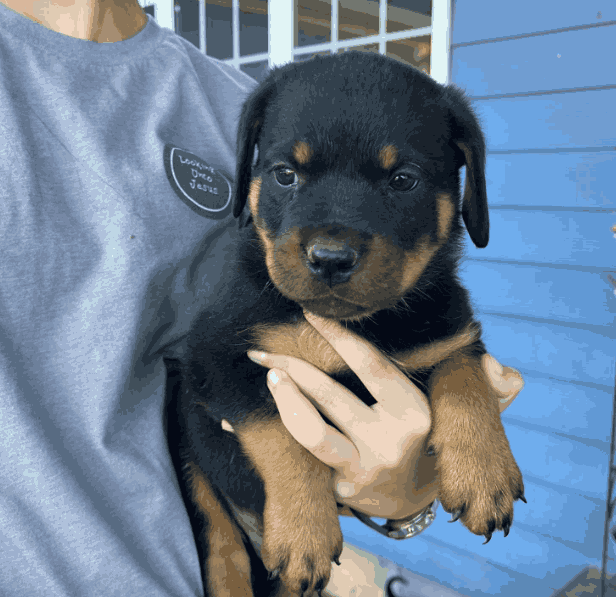
Puppy Parties and Playdates:
Once your Rottie pup has had their first round of vaccines, it’s time to introduce them to the wider world of canine companionship.
- Puppy Parties: These supervised play sessions with other puppies are like preschool for your Rottie. They learn how to interact with other dogs, read body language, and develop those all-important social skills.
- Playdates with Adult Dogs: Arrange playdates with friendly, well-socialized adult dogs to help your puppy learn how to interact with dogs of different ages and temperaments.
- Choosing the Right Playmates: Not all dogs are created equal, especially when it comes to puppy playdates. Choose dogs who are gentle, patient, and have a good track record with puppies. And always supervise those interactions to make sure everyone is having a good time.
Exposure to Different Environments:
Variety is the spice of life, especially for a Rottweiler puppy! The more diverse environments they experience, the more adaptable and confident they’ll become.
- A World of Adventures: Think parks, busy streets, pet-friendly stores, the vet clinic – the possibilities are endless! Gradually introduce your puppy to these different environments, using positive reinforcement to create positive associations.
- Sensory Overload: Don’t forget about those other senses! Expose your puppy to different sounds (car horns, sirens, that dreaded vacuum cleaner), sights (umbrellas, hats, bicycles), and even textures (grass, concrete, gravel).
- Car Rides: Those car rides aren’t just for vet visits! Take your puppy on short car trips to get them used to the motion and the sights and sounds of the road.
Meeting New People:
Socialization isn’t just about dogs; it’s about humans too! Introduce your Rottie puppy to a wide variety of people, from those friendly faces in your neighborhood to the mail carrier and the grocery store clerk.
- Diverse Interactions: The more diverse the interactions, the better. Let your puppy meet people of different ages, genders, appearances, and abilities. This helps them become comfortable and confident around all sorts of humans.
- Positive Greetings: Teach your puppy how to greet people politely without jumping or nipping. Reward them with praise and treats for calm, friendly behavior.
- Handling and Touch: Continue to desensitize your puppy to being handled and touched all over. This makes vet visits and grooming sessions much easier and less stressful.
Sound and Sight Socialization:
Remember those “Whoa, what’s that?” moments? Help your Rottie navigate those by gradually exposing them to various sounds and sights.
- Everyday Noises: Get them used to the sounds of everyday life, like the vacuum cleaner, doorbell, and traffic noises.
- Unusual Sounds: Don’t forget about those less frequent but potentially scary sounds, like thunderstorms, fireworks, or construction noises.
- Visual Stimuli: Introduce them to things that might look strange or move in unexpected ways, like umbrellas, hats, bicycles, and even those weird inflatable lawn ornaments.
Socialization Checklist:
Alright, you’re ready to embark on this socialization adventure with your Rottweiler puppy. But with so much to explore, it’s easy to get overwhelmed (and maybe miss a few key experiences). That’s where this handy checklist comes in! Think of it as your Rottie’s passport to the world, filled with stamps of confidence and positive experiences.
People:
- Diverse Ages: Babies, toddlers, children, teenagers, adults, seniors.
- Different Genders: Men and women.
- Varied Appearances: People of different ethnicities, heights, body types, and clothing styles (hats, glasses, uniforms, etc.).
- People with Mobility Aids: Wheelchairs, canes, crutches, walkers.
- People Doing Things: People running, jogging, biking, playing sports, gardening, using tools, etc.
Dogs:
- Puppies: Supervised play with other puppies of different breeds and sizes.
- Adult Dogs: Playdates with friendly, well-socialized adult dogs.
- Different Sizes and Breeds: Exposure to dogs of various sizes and breeds.
Other Animals:
- Cats: If possible, introduce your Rottie puppy to friendly cats.
- Other Pets: Consider exposure to other pets, such as rabbits, birds, or livestock (if relevant to your lifestyle).
Environments:
- Outdoor Spaces: Parks, fields, forests, beaches.
- Urban Environments: Busy streets, sidewalks, crosswalks, traffic.
- Indoor Spaces: Pet-friendly stores, vet clinics, friends’ homes.
- Different Surfaces: Grass, concrete, gravel, sand, wood chips, etc.
Sounds:
- Household Noises: Vacuum cleaner, doorbell, blender, washing machine, etc.
- Outdoor Noises: Traffic, sirens, construction, thunder, fireworks, etc.
- Animal Sounds: Barking dogs, meowing cats, birds chirping, etc.
Sights:
- Moving Objects: Cars, bicycles, skateboards, scooters, etc.
- Unusual Objects: Umbrellas, balloons, flags, statues, etc.
- Different Lighting: Bright sunlight, dim lighting, shadows, etc.
Handling and Touch:
- Gentle Handling: Touching paws, ears, mouth, tail, and body.
- Vet Exam Practice: Simulate a vet exam by gently touching and examining your puppy.
- Grooming Practice: Get your puppy used to being brushed, having their nails trimmed, and their ears cleaned.
Remember:
- Prioritize safety: Always supervise interactions and avoid overwhelming your puppy.
- Use positive reinforcement: Praise, treats, and a happy voice can go a long way in creating positive associations.
- Be patient and understanding: Socialization takes time and consistency.
- Make it fun! Socialization should be an enjoyable experience for both you and your puppy.
By using this checklist as a guide, you can ensure that your Rottweiler puppy is exposed to a wide range of experiences, setting them up for a lifetime of confidence and social skills.
Socialization Superpowers: Tips and Tricks for Success
Alright, you’re ready to embark on this socialization adventure with your Rottweiler puppy. But before you unleash them into the world, let’s equip you with some extra tips and tricks to make the experience a success.
Positive Reinforcement: The Power of “Good Job!” (and Maybe a Treat or Two)
Think of positive reinforcement as your socialization magic wand. Every time your Rottie puppy encounters something new and reacts calmly or with curiosity, shower them with praise, treats, or a favorite toy. This helps them associate new experiences with good things, making them more likely to approach the world with confidence and enthusiasm.
Gradual Exposure: Baby Steps to a Brave Rottie
Don’t throw your puppy into the deep end (literally or figuratively!). Introduce new experiences gradually. Start with short exposures to new stimuli, and gradually increase the intensity and duration as your puppy becomes more comfortable. And always keep an eye out for those signs of fear or anxiety – tail tucking, lip licking, yawning, or trying to hide. If you see those signs, it’s time to take a step back and try again later when they’re more relaxed.
Safe Interactions: Protecting Your Pup
Safety first! Especially before your Rottweiler puppy is fully vaccinated, be extra cautious about where you take them and who they interact with. Choose playmates and environments carefully, avoiding areas where unvaccinated dogs might have been. And always supervise interactions with other dogs to ensure everyone is playing nicely.
Handling Fear and Stress: When Things Get a Little Ruff
Even with the best intentions, your puppy might encounter something that scares them. If they show signs of fear or stress, don’t hesitate to remove them from the situation. There’s no shame in retreating and trying again another time when they’re feeling more confident. Remember, the goal is to create positive associations, not traumatic ones.
Quality over Quantity: Meaningful Experiences Matter
It’s not about checking off a list of 100 things in 100 days. Focus on the quality of the experiences, not just the quantity. A few well-planned, positive interactions can be far more valuable than a whirlwind of overwhelming experiences. Make each socialization opportunity count by creating a safe, supportive, and enjoyable experience for your Rottweiler puppy.
With these extra tips in your socialization toolkit, you’ll be well-equipped to guide your Rottweiler puppy on their journey to becoming a confident, well-adjusted, and happy adult dog.
Continuing Socialization: It's a Lifelong Journey
Alright, you’ve rocked those early socialization weeks, and your Rottweiler puppy is well on their way to becoming a confident, well-adjusted canine citizen. But hold on! Don’t put those training treats away just yet. Socialization isn’t a one-and-done deal; it’s a lifelong journey of learning and adapting.
Maintaining those Social Butterfly Skills
Think of those early socialization experiences as building the foundation of your Rottweiler’s social skills. But just like any skill, those social graces need to be practiced and maintained throughout their life.
- Keep those Playdates Going: Regular playdates with friendly dogs, trips to the dog park (once they’re fully vaccinated and have mastered dog park etiquette), and even just casual encounters with other dogs on walks help your Rottie keep those social skills sharp.
- Human Interactions: Continue to introduce your Rottie to new people, reinforcing those positive greetings and calm behaviors. This helps them stay comfortable and friendly around all sorts of humans.
New Experiences: Keeping Life Interesting (and a Little Bit Challenging)
Just like we humans enjoy trying new things and exploring new places, so do our Rottweilers! Keeping things fresh and exciting helps them stay adaptable and confident.
- Adventure Time: Explore new parks, go on hikes, try different walking routes, or even take a road trip to a dog-friendly destination. New sights, sounds, and smells keep their minds engaged and prevent them from becoming overly sensitive to changes in their routine.
- Challenge Accepted: Introduce your Rottie to new challenges, like agility courses, obedience training, or even therapy dog training. These activities not only provide mental and physical stimulation but also help them build confidence and resilience.
Addressing Fear or Anxiety: When Things Get a Little Spooky
Even the most well-socialized Rottweiler might encounter something that spooks them. Maybe it’s a loud noise, a strange object, or an unfamiliar situation. The key is to handle these moments with patience and understanding.
- Don’t Force It: Never force your Rottie to confront something that frightens them. This can create negative associations and worsen their fear.
- Create a Safe Space: Provide a safe space for them to retreat if they feel overwhelmed. This could be their crate, a quiet room, or even just behind your legs.
- Positive Reinforcement: Use positive reinforcement to help them associate the scary thing with something positive, like treats or praise.
- Gradual Desensitization: If possible, gradually desensitize them to the scary thing by exposing them to it at a low intensity and gradually increasing the intensity over time.
Socialization for Adult Rottweilers:
What if your Rottweiler missed out on some of that crucial early socialization? Don’t worry, it’s not too late! Adult Rottweilers can still learn and adapt, but it might take a little more patience and effort.
- Start Slowly: Introduce new experiences gradually and at a pace that your Rottie is comfortable with.
- Focus on Positive Reinforcement: Use plenty of praise, treats, and encouragement to create positive associations.
- Seek Professional Help: If you’re struggling with socializing an adult Rottweiler, consider seeking guidance from a certified dog trainer or behaviorist.
Socialization Schedule:
To help keep your Rottie’s social skills sharp, consider creating a socialization schedule. This could include weekly playdates, monthly trips to new places, or even just setting aside time each day for some interactive games or training sessions.
The Importance of Continued Socialization:
Socialization isn’t just a puppy thing; it’s a lifelong journey that helps your Rottweiler thrive in a constantly changing world. By providing ongoing opportunities for positive experiences and challenges, you can help your Rottie maintain their confidence, adaptability, and overall well-being.
Troubleshooting Socialization Challenges
Okay, so you’re putting in the effort, socializing your Rottweiler like a pro. But what happens when things don’t go exactly as planned? What if your Rottie shows signs of fear, aggression, or just gets a little too excited in certain situations? Don’t worry, we’ve got you covered!
Common Socialization Challenges:
- Fear or Anxiety: Your Rottie might cower, hide, or try to escape in new situations or when encountering unfamiliar people or dogs.
- Aggression: They might growl, bark, lunge, or even try to bite when feeling threatened or uncomfortable.
- Overexcitement: They might jump, bark excessively, or become overly stimulated in social situations, making it difficult to control their behavior.
Solutions and Strategies:
- Identify the Triggers: What specifically is causing your Rottie to react this way? Is it a certain type of person, dog, or environment? Once you identify the triggers, you can start to address the issue.
- Positive Reinforcement: Continue to use positive reinforcement to build your Rottie’s confidence and create positive associations with the things that trigger their fear or anxiety. Reward them with praise, treats, or toys when they exhibit calm behavior in challenging situations.
- Gradual Desensitization: If possible, gradually desensitize your Rottie to the triggers. Start by exposing them to the trigger at a low intensity (from a distance or for a short period) and gradually increase the intensity as they become more comfortable.
- Counter-Conditioning: Pair the trigger with something positive, like a favorite treat or toy. This helps change their emotional response to the trigger from negative to positive.
- Environmental Modification: Sometimes, modifying the environment can help reduce your Rottie’s anxiety or reactivity. For example, if they’re afraid of loud noises, provide them with a safe, quiet space during thunderstorms or fireworks.
- Training: Obedience training can help you manage your Rottie’s behavior in challenging situations. Commands like “sit,” “stay,” and “leave it” can help redirect their attention and prevent unwanted behaviors.
- Seek Professional Help: If you’re struggling to address your Rottie’s socialization challenges on your own, don’t hesitate to seek professional help from a certified dog trainer or behaviorist. They can assess your Rottie’s behavior, identify the root cause of the problem, and create a customized training plan.
Remember: Socialization challenges are not uncommon, and with patience, consistency, and the right approach, you can help your Rottweiler overcome these challenges and become a more confident and well-adjusted companion.
Puppy Classes and the AKC S.T.A.R. Puppy Program
You’ve been rocking the at-home socialization, but now it’s time to take your Rottweiler puppy’s education to the next level! Puppy classes and programs like the AKC S.T.A.R. Puppy program can be invaluable resources on your socialization journey.
Puppy Classes: Socialization and Skills in One Awesome Package
Think of puppy classes as a combination of preschool and a fun social club for your Rottie. They get to learn essential skills, meet new friends (both human and canine), and explore a whole new environment.
- Benefits of Puppy Classes:
- Socialization Supercharge: Puppy classes provide a safe and controlled environment for your Rottie to interact with other puppies and learn those all-important social cues.
- Basic Obedience Training: Many puppy classes also incorporate basic obedience training, teaching your Rottie essential commands like “sit,” “stay,” and “come.”
- Expert Guidance: A qualified instructor can provide valuable guidance and feedback on your puppy’s behavior and progress.
- Confidence Boost: Puppy classes can help boost your Rottie’s confidence and expose them to new experiences in a positive way.
AKC S.T.A.R. Puppy: Aiming for Gold (Star, That Is!)
The AKC S.T.A.R. Puppy program is like earning a gold star in puppy training and socialization. It’s a program designed to promote responsible dog ownership and help puppies develop into well-mannered companions.
- What it Involves: The program focuses on socialization, training, activity, and responsible ownership (hence the acronym S.T.A.R.). To earn the title, your puppy must complete a six-week training class and pass a simple test that evaluates their behavior and basic obedience skills.
- Benefits of the Program:
- Socialization Goals: The program encourages socialization by requiring your puppy to interact with different people and tolerate being handled.
- Training Foundation: It helps establish a foundation of basic obedience training, setting your Rottie up for success in future training endeavors.
- Responsible Ownership: The program emphasizes responsible dog ownership, educating you on proper care, health, and behavior management.
The Bottom Line:
Puppy classes and programs like the AKC S.T.A.R. Puppy program are valuable resources that can complement your at-home socialization efforts. They provide a structured learning environment, expert guidance, and opportunities for your Rottweiler puppy to shine!
Conclusion
Imagine this: you’re strolling through the park with your Rottweiler, and they spot another dog approaching. Instead of barking or lunging, your Rottie calmly wags their tail, maybe even offers a playful bow, and engages in a friendly sniff-and-greet. A well-socialized Rottweiler is a joy to behold – they’re confident, adaptable, and friendly, making them fantastic companions and ambassadors for their breed.
Here are some hallmarks of a well-socialized Rottie:
- Confident in New Situations: They approach new experiences with curiosity and calmness, rather than fear or anxiety.
- Friendly with People: They greet people politely, without excessive barking or jumping. They’re comfortable being petted and handled by strangers (once you’ve given the okay, of course!).
- Playful with Other Dogs: They enjoy interacting with other dogs, engaging in appropriate play and respecting social cues.
- Adaptable to Different Environments: They can handle a variety of environments, from bustling city streets to quiet nature trails, without becoming overwhelmed or stressed.
- Well-Mannered: They understand basic commands and have good manners, making them welcome guests wherever they go.
Final Thought:
Socializing your Rottweiler is an investment in their happiness, well-being, and the strength of your bond. It’s about giving them the tools they need to navigate the world with confidence and joy, and it’s about showing the world that Rottweilers, when properly socialized, are truly amazing companions. So, go out there, explore the world with your Rottie, and create those positive experiences that will shape their personality and enrich their lives. You’ll be amazed by the incredible dog you’ve helped them become.
FAQs: Your Burning Questions Answered!
1. When should I start socializing my Rottweiler puppy?
Answer: Start socializing your Rottweiler puppy as early as possible, ideally between 3 and 14 weeks of age. This is the critical socialization period when their brains are most receptive to new experiences.
2. How can I socialize my Rottweiler puppy at home?
Answer: You can start socializing your puppy at home by:
- Handling them gently: Touch their paws, ears, and mouth to get them used to being handled.
- Introducing them to different sounds: Play recordings of common household noises, traffic sounds, and other noises they may encounter in their environment.
- Exposing them to different surfaces: Let them walk on different types of flooring, grass, and other surfaces.
Introducing them to new objects: Show them different toys, household items, and other objects they may encounter.
3. What are some common socialization challenges with Rottweilers?
Answer: Some common socialization challenges with Rottweilers include fear or anxiety in new situations, aggression towards other dogs or people, and overexcitement. These challenges can often be addressed with positive reinforcement, gradual desensitization, and professional training if needed.
4. Are puppy classes beneficial for Rottweiler socialization?
Answer: Yes, puppy classes are highly beneficial for Rottweiler socialization. They provide a safe and controlled environment for puppies to interact with other dogs and people, learn basic obedience, and build confidence.
5. Can I still socialize an adult Rottweiler if they missed out on early socialization?
Answer: Yes, you can still socialize an adult Rottweiler, but it may require more patience and effort. Start slowly, use positive reinforcement, and consider seeking guidance from a certified dog trainer or behaviorist.
Want to master more than just socialization? Our complete Rottweiler puppy training guide covers everything you need to know for those crucial first six months! From housebreaking and crate training to basic commands and preventing puppy biting, we’ve got you covered. Check out “Rottweiler Puppy Training: Your First 6 Months (A Complete Guide)” to raise a happy, well-behaved Rottie pup!


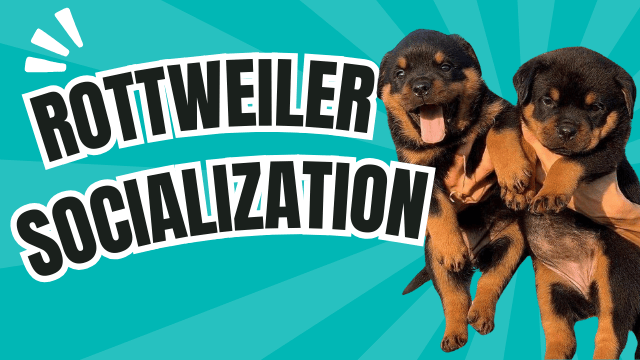


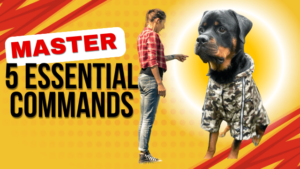
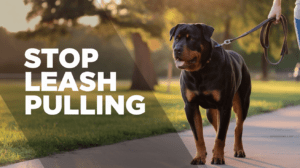
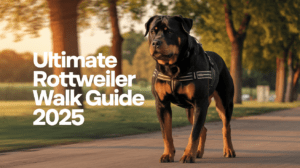
Pingback: Rottweiler Puppy Training: Your First 6 Months (A Complete Guide)